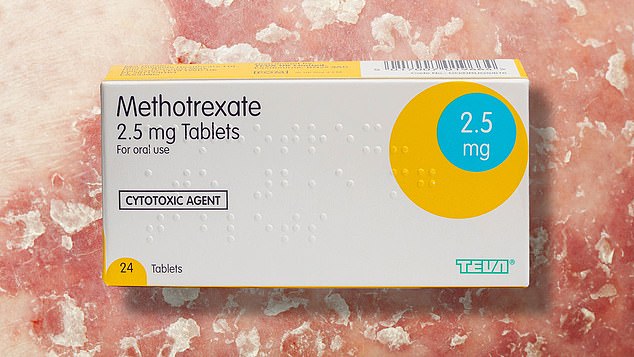Hope for millions living with crippling knee pain as trial shows autoimmune drug eases osteoarthritis



A study suggests that millions of people suffering from knee osteoarthritis could benefit from a drug already used to treat autoimmune diseases.
Researchers found that methotrexate relieved both the pain and stiffness associated with the disease, a breakthrough that offers patients ‘real hope’.
Around 5.4 million people in the UK have osteoarthritis of the knee. This condition occurs when the body can no longer keep the joint healthy and pain-free.
Current options for pain management are limited, short-term and often provide little to no benefit.
Research by the Versus Arthritis Foundation shows that one third of people with osteoarthritis experience severe pain every day.

About 5.4 million people in the UK have osteoarthritis of the knee, which occurs when the body can no longer keep the joint healthy and pain-free.
Doctors from the University of Leeds and Leeds Teaching Hospitals NHS Trust recruited 155 patients with knee osteoarthritis who were not responding to current medications.
Patients were divided into two groups, with half receiving a placebo and the other half receiving methotrexate tablet form once a week for a period of 12 months.
The results, published in the medical journal Annals of Internal Medicine, show that patients taking methotrexate experienced less pain and stiffness after six months.
The drugs work by reducing the activity of the immune system.
Researcher Professor Philip Conaghan said: ‘There is an urgent need for treatments to relieve the pain of osteoarthritis.
‘Although many trials have been conducted with potential new treatments, these have not yet shown any real benefit. People with osteoarthritis therefore have few options.
‘We are therefore very excited about our findings, which show that methotrexate could offer a potential new treatment.
‘Our research shows that a drug that is already widely used in rheumatoid arthritis, methotrexate, may help with the pain of osteoarthritis. We also gain insight into which subgroup of patients, those with increased levels of inflammation in the blood, may benefit from this therapy.’
Exercise, weight management, and physical therapy are the recommended approaches for treating osteoarthritis. However, patients experience significant pain and stiffness, making additional therapies such as medications usually necessary. However, these are limited.
Joint replacements may be considered for long-term relief in people with very advanced osteoarthritis, but NHS waiting lists are often long and people can be left in pain for years.
Dr Sarah Kingsbury, who also worked on the study, said: ‘While this research shows promise for a new treatment for osteoarthritis, there are still questions to be answered before methotrexate can be widely introduced.
‘Our findings suggest that some people benefit more from methotrexate than others. Our next step is to understand this better, determine what dose of methotrexate is best, and assess the cost-effectiveness of methotrexate as a treatment for osteoarthritis.’

Researchers found that methotrexate eased both the pain and stiffness associated with the disease, in a breakthrough that offers ‘real promise’ to patients
Arthritis can have a huge impact on your ability to work, care for your family, move without pain, and live independently.
Lucy Donaldson, director of research and health information at Versus Arthritis, which funded the study, hailed the research findings as a promising breakthrough.
She said: ‘Osteoarthritis research has come a long way in our lifetime, but we still have a long way to go.
‘There is an urgent need for new ways to treat osteoarthritis pain. The results of this study are therefore very promising.
‘These findings could offer real hope for millions of people suffering from knee osteoarthritis.
‘Against the backdrop of unacceptably long waiting lists for joint replacements, this study underscores the value of research and why arthritis needs greater priority and investment.’
73-year-old war veteran Roger Van-Cauter from Shropshire has a number of conditions, including osteoarthritis in his hands, hips and knees.
He said: ‘Osteoarthritis is my biggest problem. It’s very painful and because I was super fit, all my joints are deteriorating.’
‘I have been struggling with my knees for a while now. I was diagnosed with osteoarthritis in my 40s after experiencing pain whilst completing the Great North Run.
‘I used to do a lot of triathlons, mountain climbing and marathons.
‘Now I’m a little wobbly on my legs, even just walking.
‘When you’re home alone and you can’t do things to take your mind off the aches and pains, it’s really hard and it affects your mental health.
‘I need better treatments for my arthritis. It’s hard when the painkillers I take don’t make my knees any less painful, nor my wrists, fingers and toes.
“There are millions of people crying out for better medicine so we can get back to doing what we love. News like this really gives people like me hope for the future.”




